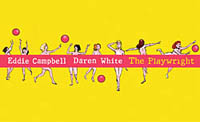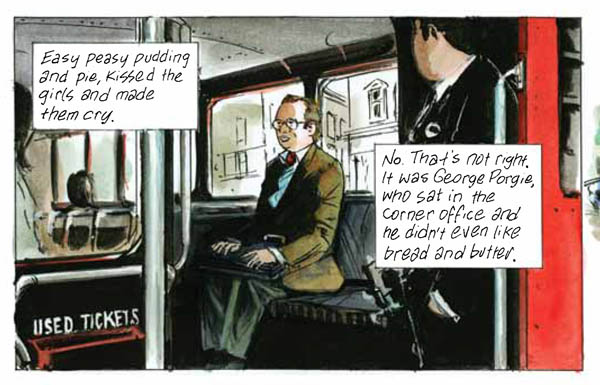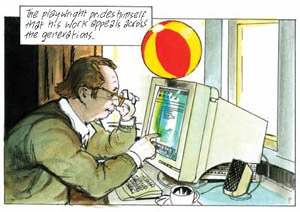 Written by Daren White
Written by Daren White
Art by Eddie Campbell
144 pages, color
Published by Top Shelf Productions and Knockabout Comics
I’ve always appreciated that Eddie Campbell isn’t afraid to take on strange projects. In theory, he could have kept writing and drawn Bacchus over the years, which had a built-up audience and a reputation within comics, or stuck with his autobiographical alter ego Alec. But instead, he’s continued to pick up different oddities over the years, the latest of which is Daren White’s script about a socially awkward playwright. It doesn’t sound like something to set the pages on fire, but I figured that Campbell had agreed to it for a good reason. And, of course, he was right. For a book that should have been annoying, White and Campbell make it startlingly compelling.
Each of The Playwright‘s ten chapters is a different vignette about the protagonist of the book, never referred to as more than the Playwright. At first it looks like an affection on the part of White, but the further into the book you read, the more it becomes clear. Reading those early chapters, focusing on the Playwright’s immense issues with dealing with the rest of the world (women and family in particular), it starts to shape up into a much larger work about our protagonist’s mental landscape. He’s slightly damaged, more than a bit neurotic, and out of place from the rest of the world. He’s unable to function quite like everyone else, and so instead he processes everything through his scripts. It’s not the most normal way of dealing with reality, but once you see it as the only way he can connect his inner feelings and turmoil to what’s actually happening, the Playwright becomes a much more interesting character.

It also helps that White isn’t afraid to slowly change the character of the Playwright over time. It would have been easy for the book to begin and end with the main character in the same position in life, making this just a series of observations on the Playwright’s part that we get to watch slowly play out. But at the halfway point of the book, things began to shift just as the reader might otherwise grow tired of the titular character. Given new responsibilities and a genuine supporting cast, the Playwright slowly becomes sympathetic once we see him deal with the same people and problems over an extended period of time. It becomes increasingly clear (if it wasn’t already) that he’s not a bad person, just one who over the years was mistakenly left to his own devices and matured in all the wrong ways. It’s certainly no coincidence that the neglect that happened in part due to his parents focusing on the needs of the Playwright’s mentally disabled brother is eventually undone by the return of the brother into the Playwright’s life, although not in any big or dramatic fashion. Rather, it’s the moment that gets the proverbial ball rolling, and the second half of The Playwright ends up that much more interesting.
 Campbell draws The Playwright in a landscape format, with two or three panels side-by-side (almost as if we’re reading an extremely extended comic strip), then painted over with what looks to be watercolors. It’s an attractive look, despite (or perhaps because of) its distinctly average looking characters. Campbell draws nothing but ordinary people throughout The Playwright, and it’s that down to earth normal view of the world that helps contribute to my ultimate interest in the book. It would have be easy to make the Playwright into a hideous man to help play up his negative aspects, but he just looks slightly silly and out of place. His stiff poise and slightly unkempt hair bring both an attempt at being gentlemanly and a slight failure to his character, and I can’t think of a better way to sum up the character. White’s script may go a long way towards selling The Playwright, but Campbell’s art seals the deal.
Campbell draws The Playwright in a landscape format, with two or three panels side-by-side (almost as if we’re reading an extremely extended comic strip), then painted over with what looks to be watercolors. It’s an attractive look, despite (or perhaps because of) its distinctly average looking characters. Campbell draws nothing but ordinary people throughout The Playwright, and it’s that down to earth normal view of the world that helps contribute to my ultimate interest in the book. It would have be easy to make the Playwright into a hideous man to help play up his negative aspects, but he just looks slightly silly and out of place. His stiff poise and slightly unkempt hair bring both an attempt at being gentlemanly and a slight failure to his character, and I can’t think of a better way to sum up the character. White’s script may go a long way towards selling The Playwright, but Campbell’s art seals the deal.
I was actually prepared to not enjoy The Playwright; boiling the book down to its absolute basics, it sounded more like a title about a character you wouldn’t want to read about, a thoroughly unlikable person. I can’t help but feel that the wrong aspects of the book were played up, though. At the end of the day, The Playwright sneaks its charm in when you aren’t looking, and paints a robust view of a character who is anything but simple. The Playwright is a book I’d be happy to have on my bookshelves.
Purchase Links: Amazon.com | Powell’s Books
